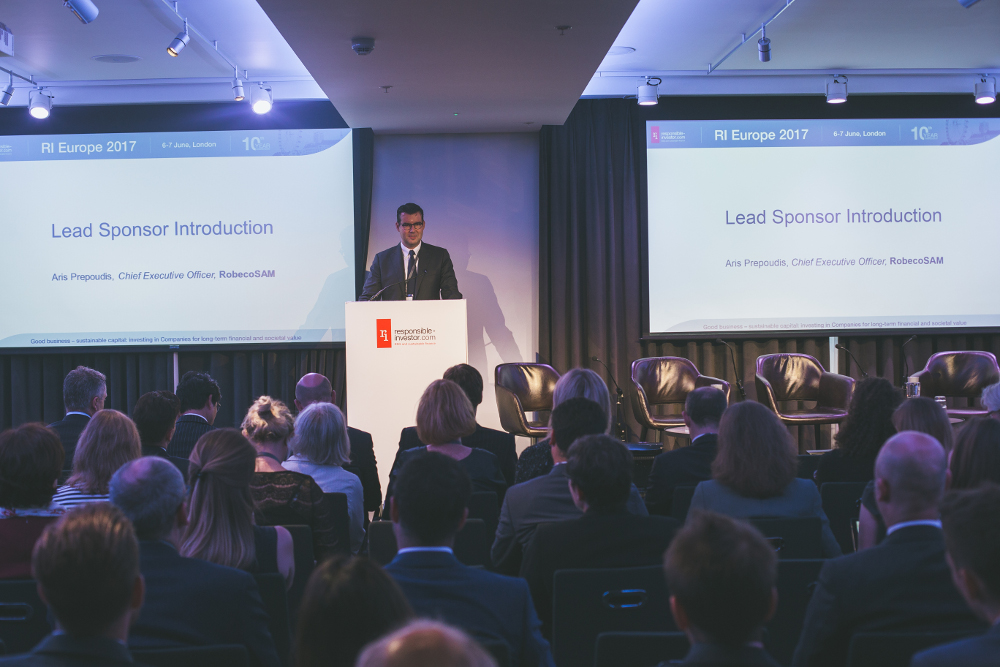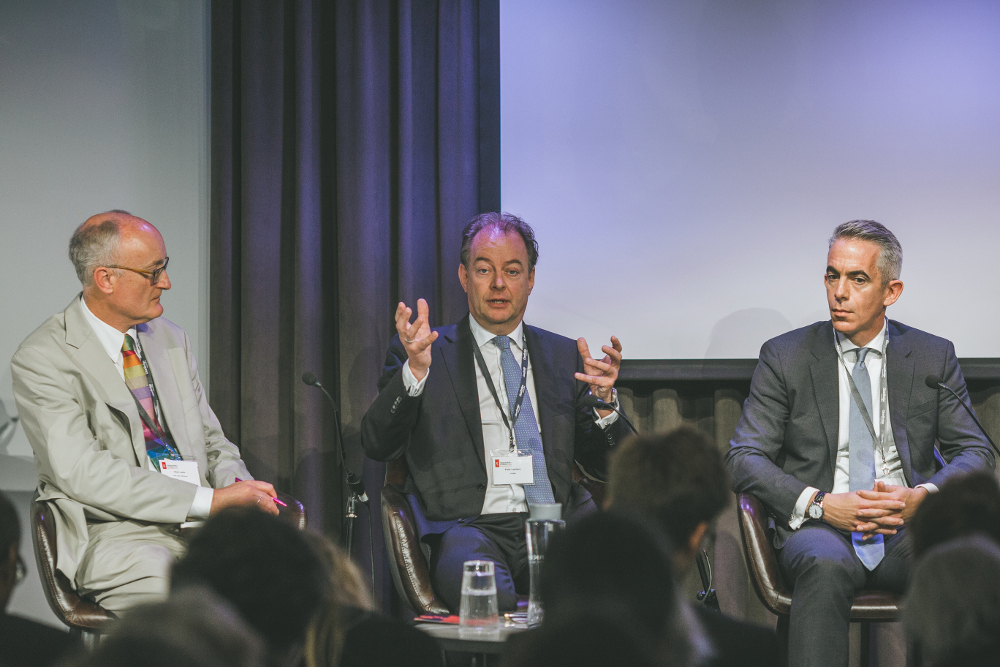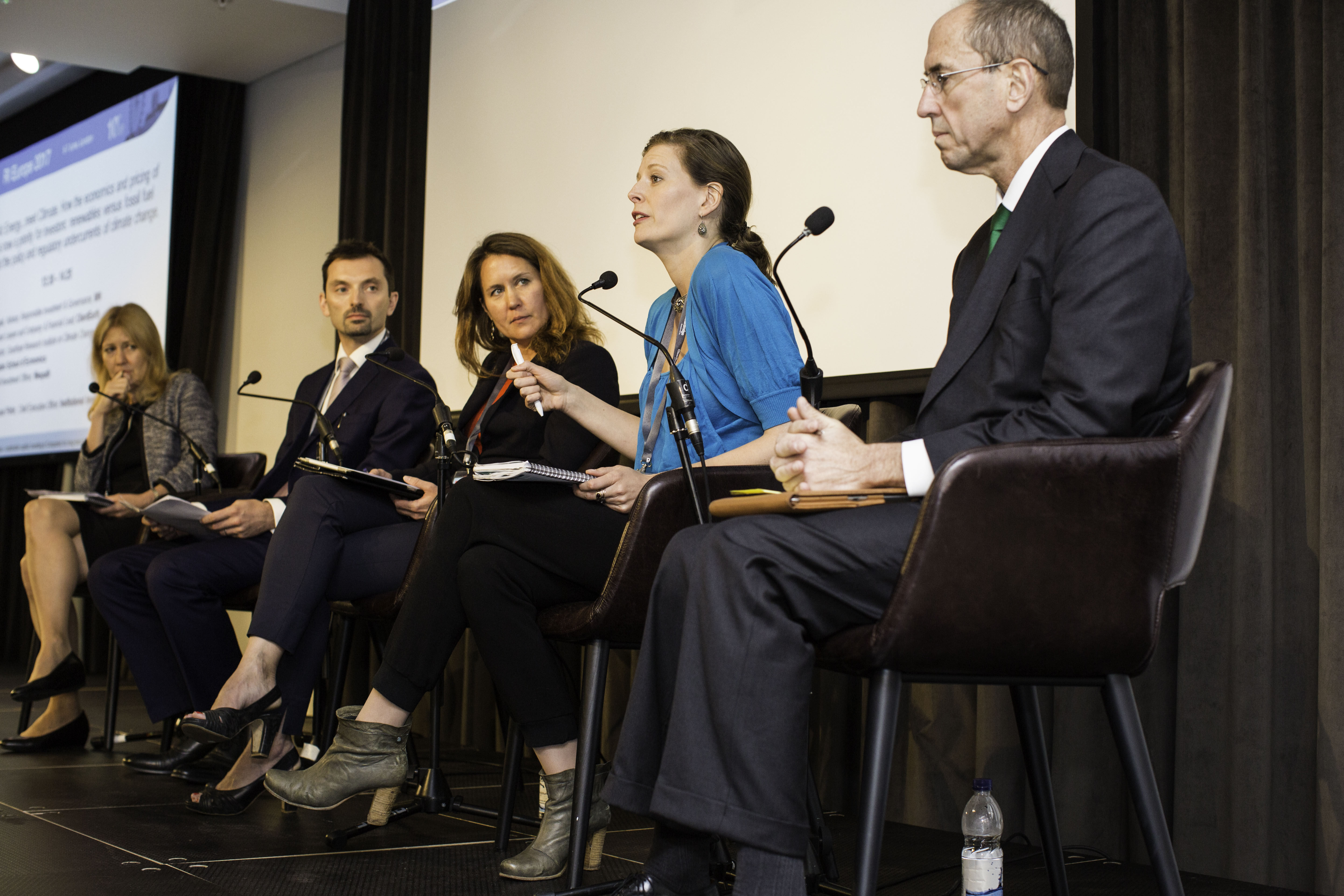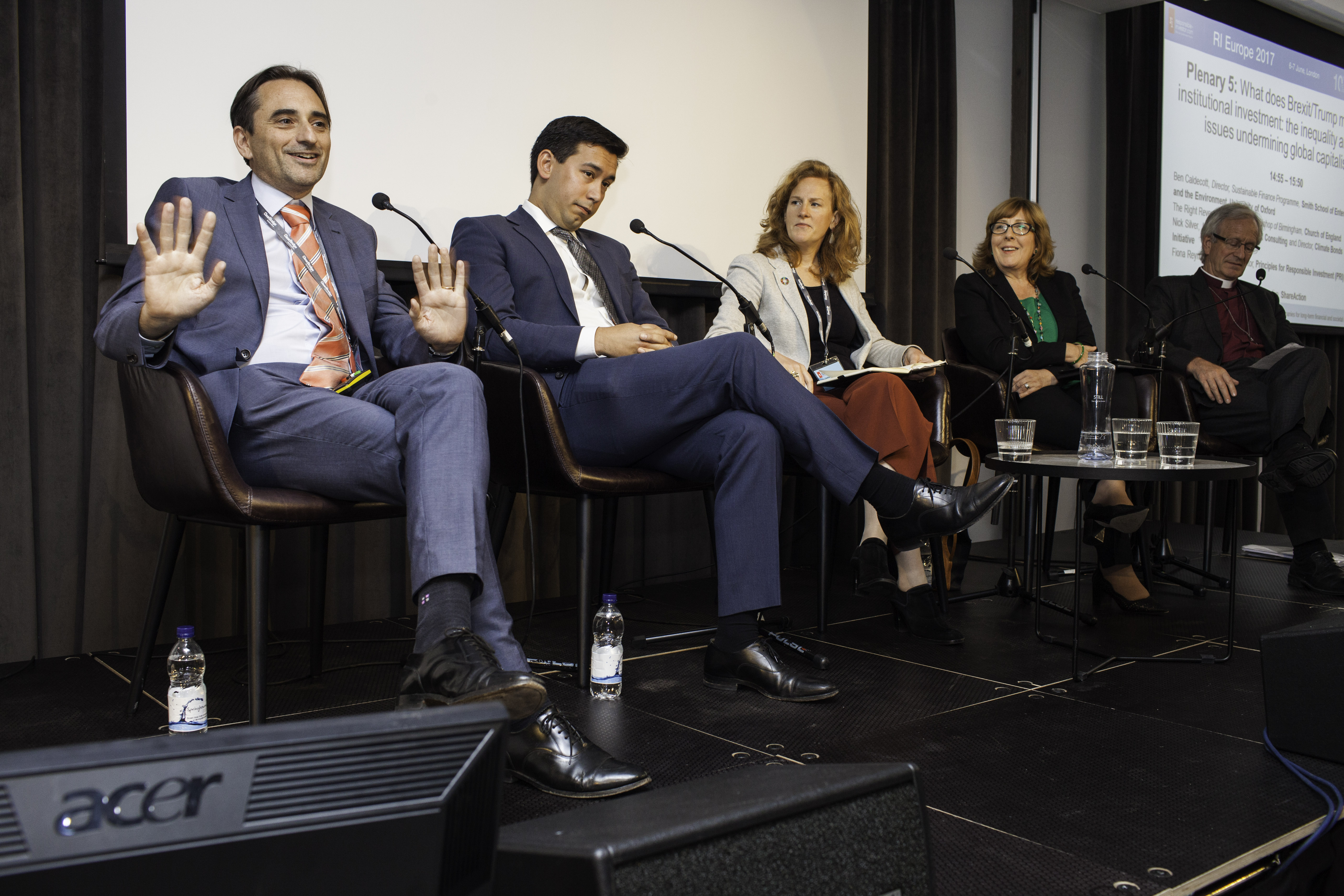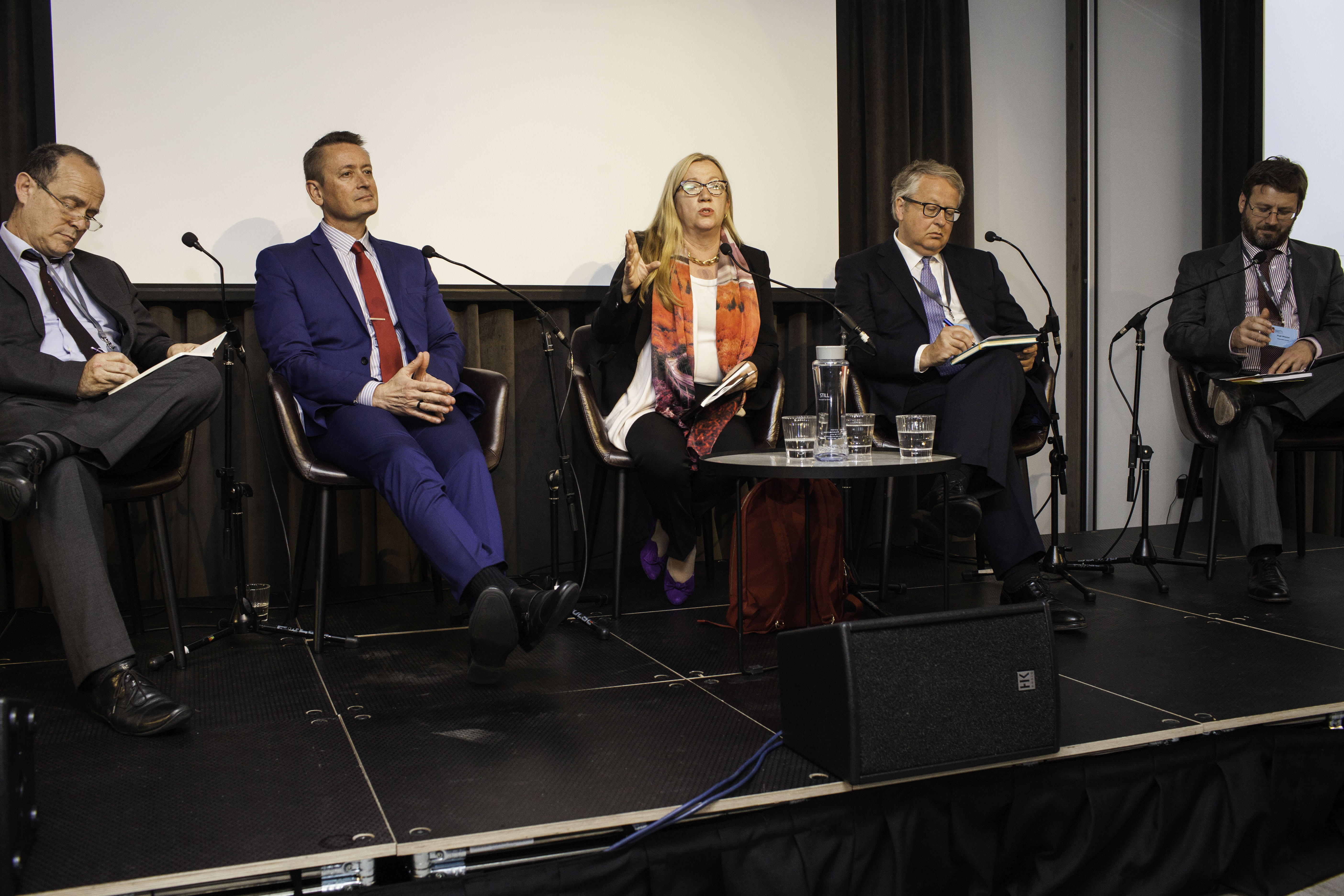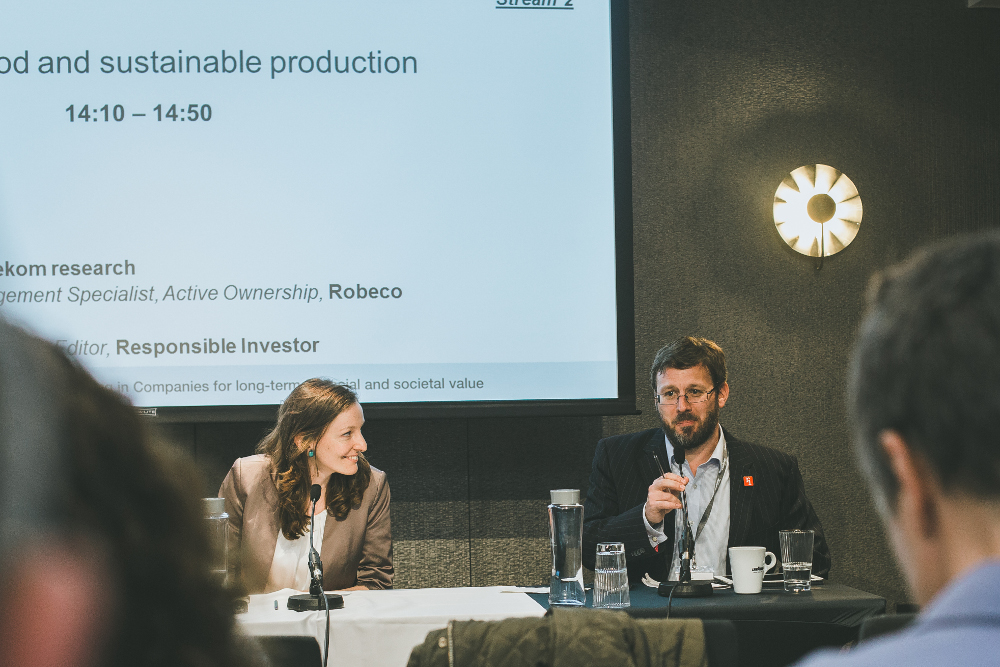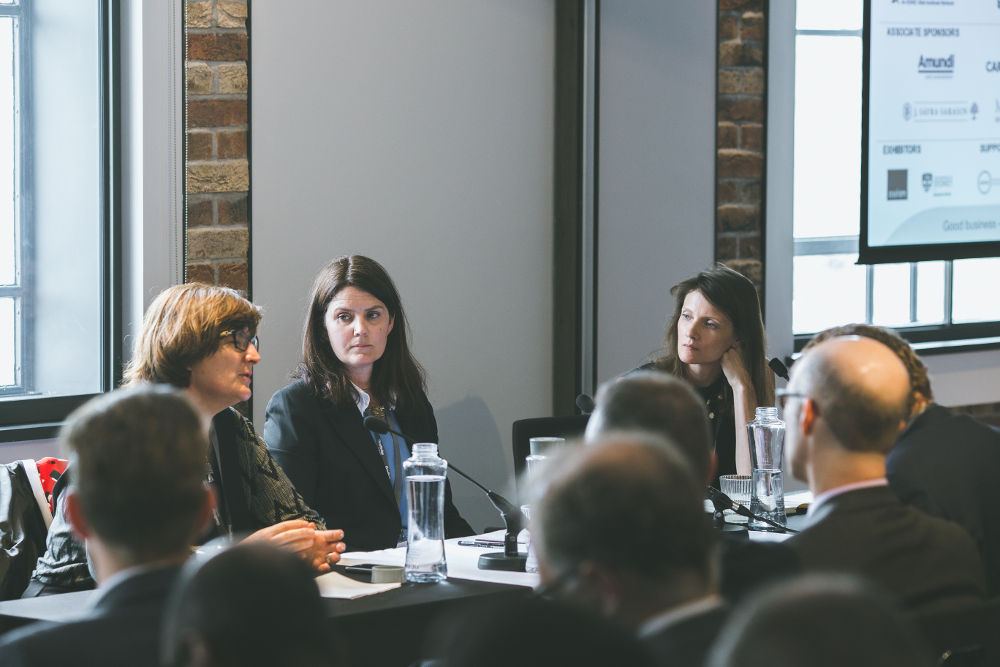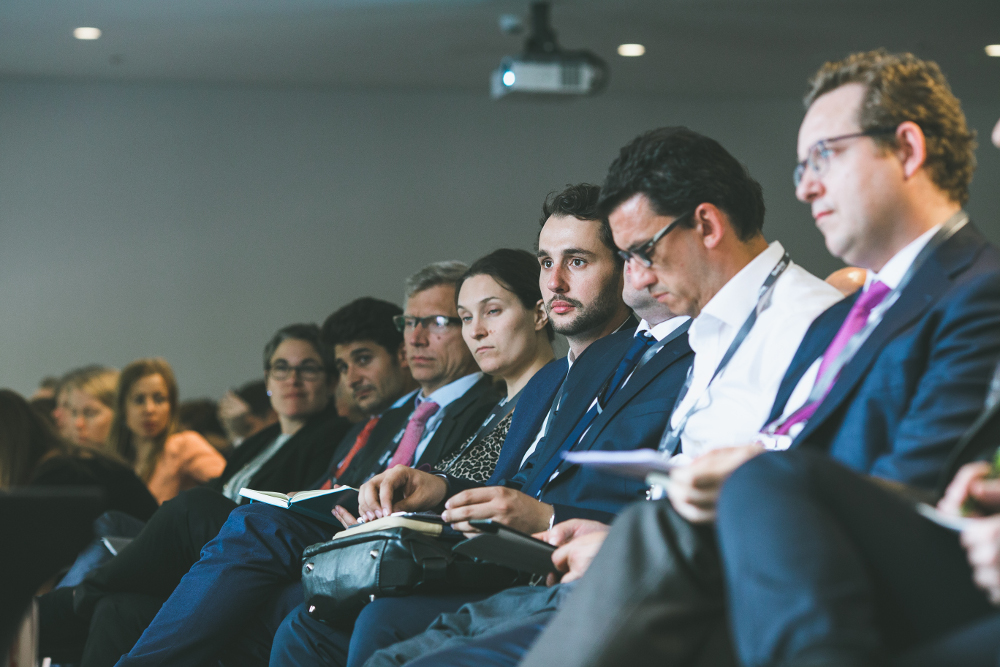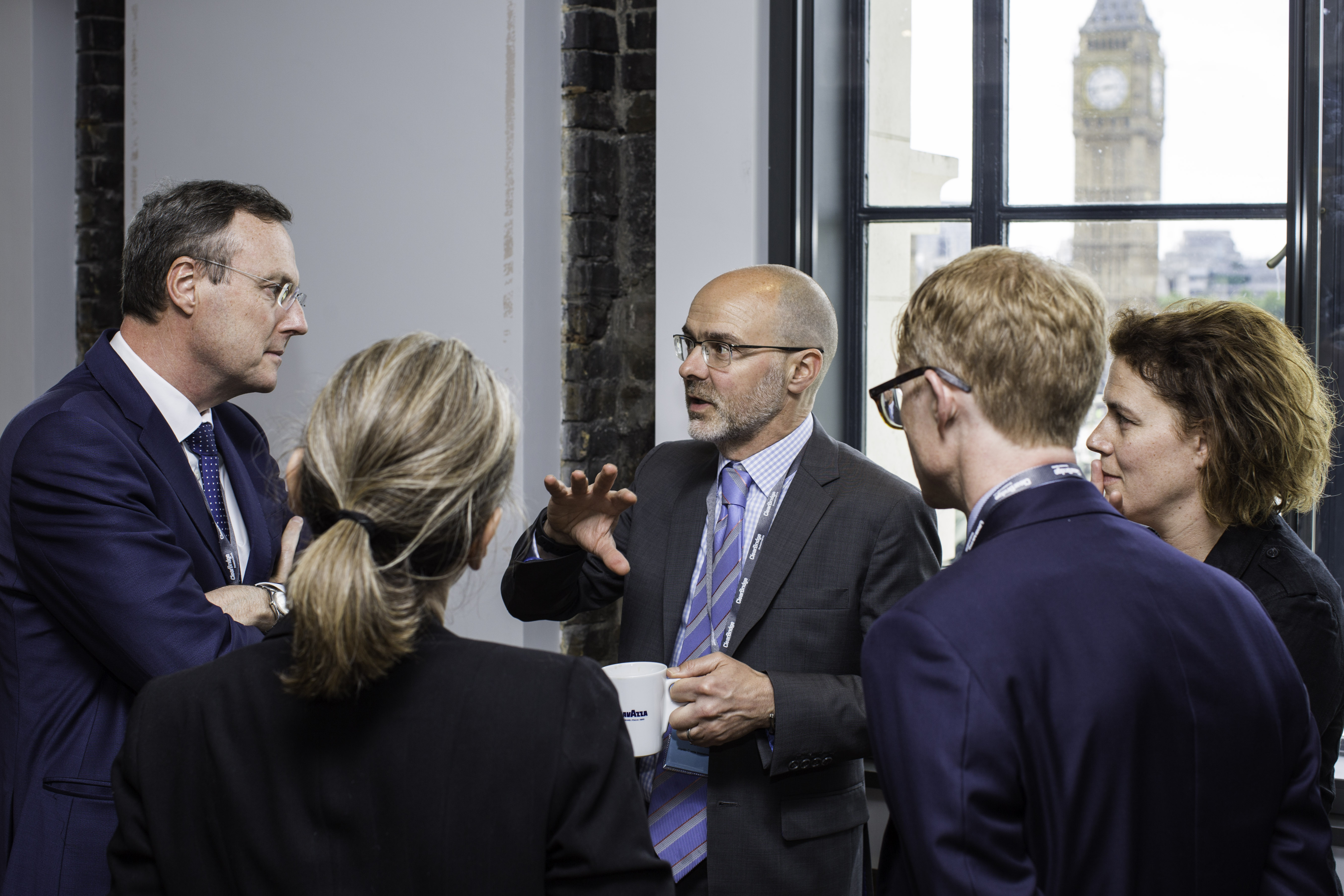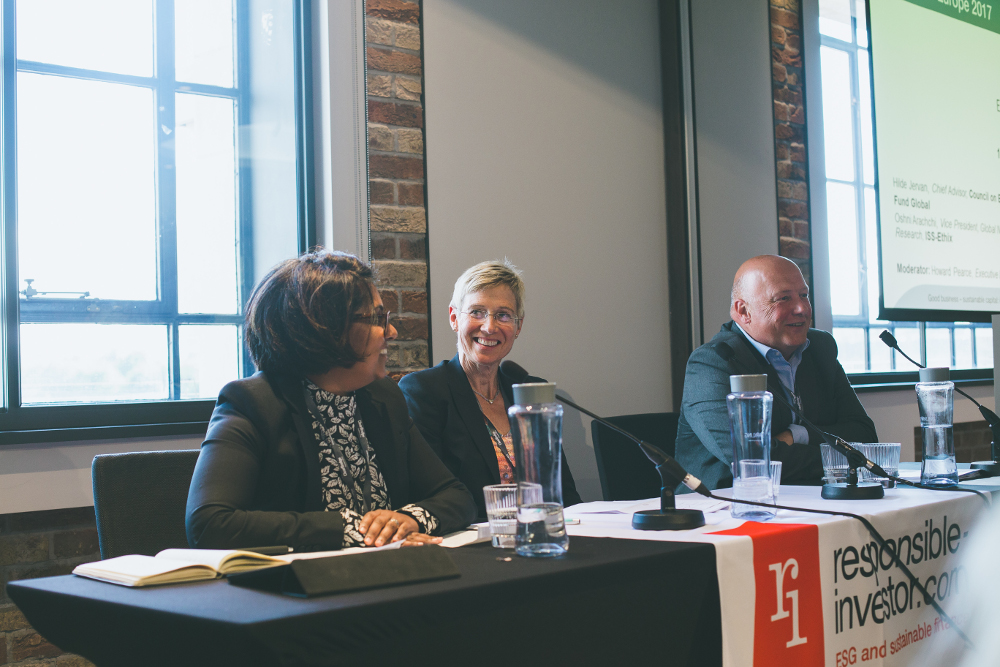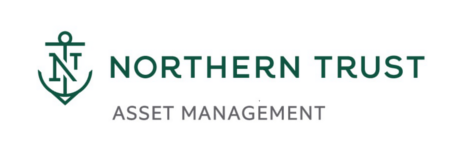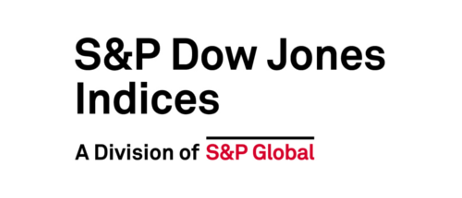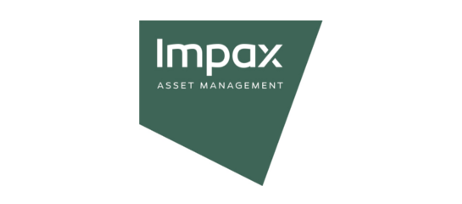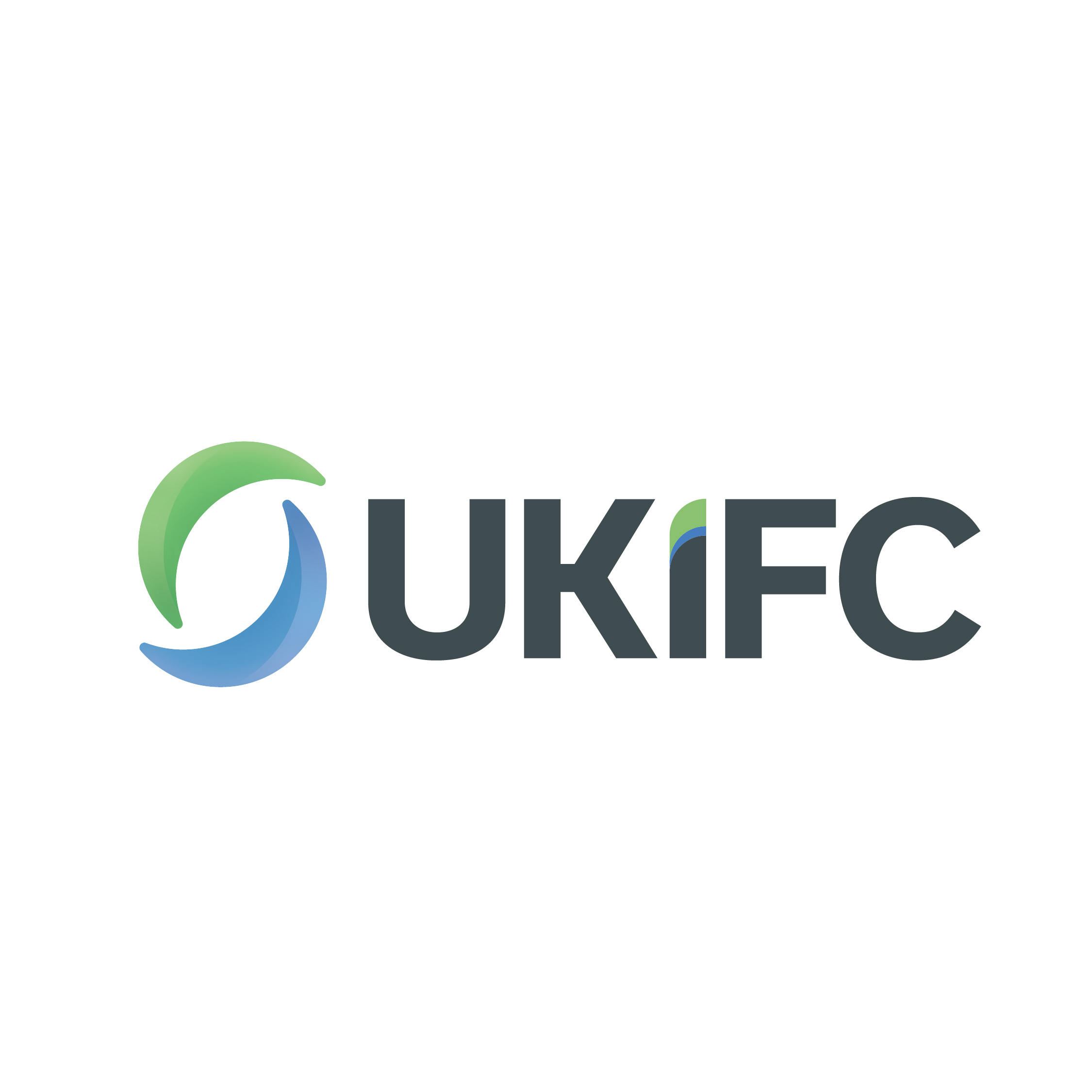Lead sponsor introduction
Aris Prepoudis, Chief Executive Officer, RobecoSAM , said the scale and speed of the transformation that the sustainable sector was undergoing was unprecedented. He said corporations’ sustainability journeys started with risk management and over time evolved into a concept that could unlock business opportunities. In investment, he said, the focus started with risk management and ethical exclusion and has developed into deeper integration of sustainability to identify better corporate business models and improve performance.
Keynote interview
GPIF's challenge on the Journey of Stewardship and ESG

Hiro Mizuno, Executive Managing Director and Chief Investment Officer, of the world’s largest asset owner, Japan’s $1.3 trillion Government Pension Investment Fund (GPIF), warned asset managers that they will receive “smaller cheques” if they don’t perform on corporate governance. But, he said it wasn’t his job to tell them how to put together responsible investment product, “in the same way that it’s up to Apple, not its clients, to design the iPhone”. Mizuno said he was “very very keen” to see new ideas from asset managers and even new business models. The fund currently has a tender out for ESG indices – to which Mizuno said it would devote a “meaningful” amount of assets.
Plenary 1:
Institutional investors always say they are long-term in outlook, so why don’t their investment strategies and their relationship with investee companies look that way? The rationale for long-term investment, and what’s blocking it?
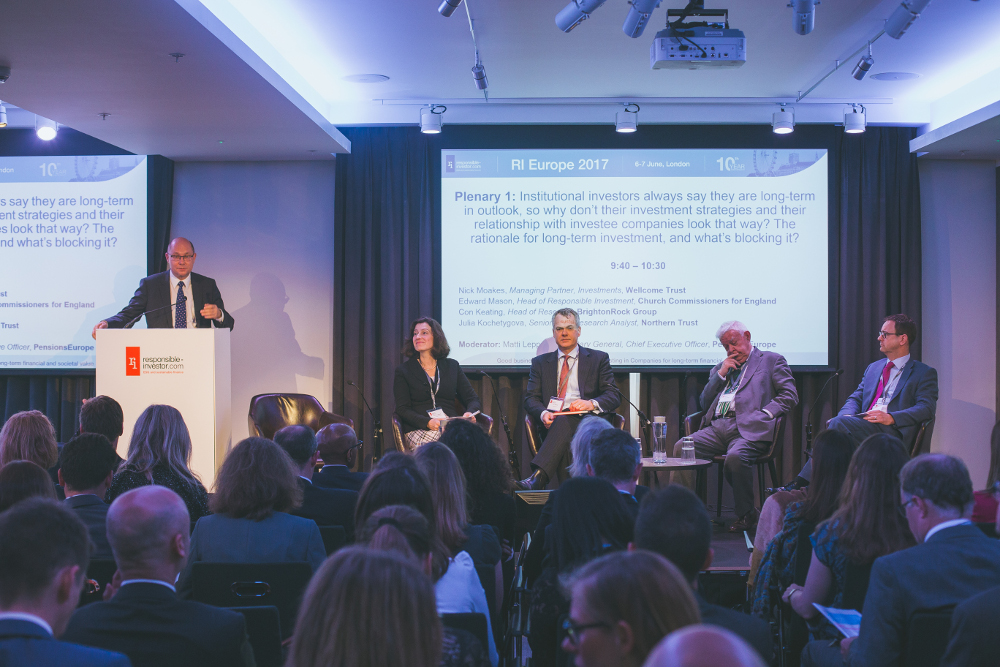
Edward Mason, Head of Responsible Investment, Church Commissioners for England “We are able to invest in long term illiquid assets (forestry, agricultural land, a prime central London estate), private equity, and keep a long term approach to listed equities. We select our managers carefully, looking for long-term discipline and we stick with them through the good times and the bad times. But don't oversimplify long term as good, short term as bad: even for us, there is a role for the short-term: we have to maintain cash and have the ability to pay short-term liabilities and for new investments.”
Julia Kochetygova, Senior ESG Research Analyst, Northern Trust, said ESG equals mainstream long-termism: “According to studies, 53% of assets managed in Europe are somehow linked to ESG strategies, every second dollar invested globally is in ESG strategies. We cannot talk of ESG versus mainstream anymore.”
Nick Moakes, Managing Partner, Investments, Wellcome Trust, said the ‘G’ refers to how investment decisions are made and not just the governance of companies.
He offered as an example the pension industry in the UK: “It is very fragmented, very small pools of assets, which means trustees are not typically well versed and rely on advice.”
“That brings in the issue of financial intermediaries and consultants. Many are not necessary aligned with the objective of being a long-term steward and investor. Immediately you are in a circle of short-termism with no stomach for volatility: “We (Wellcome Trust) are explicitly not measured against the benchmark, but against long-term returns and the expectation is 4.5% real return. However, over the last 30 years we have delivered 12% real return in sterling.”
Con Keating, Head of Research, BrightonRock Group, “A good definition of sustainability is looking after the current assets and the viability of the business right now!”
Plenary 2:
The practicality of integrating long-term, sustainable investment signals into investment decisions.
Chris Greenwald, Executive Director of Sustainable and Impact Investing at UBS Asset Management told the audience that the market should drop its obsession with chasing alpha. One of the “key road blocks” for the wider adoption of ESG, he said, is the belief that sustainability can harm an asset owner’s returns. “The academic studies and other studies show that sustainability does not harm performance, and it can lead to some risk mitigation over the long term. But there’s a sense in the sustainable investment community that this is not adequate: that we somehow need to demonstrate that sustainability adds alpha generation, and if we just do that then we will open the door to mainstream integration. And I think that this is the wrong way to think about it.” He added that “financial returns are not driven by a single set of data”.
Plenary 3:
Successful companies and long-term investors share the same goals...don’t they? If they don’t, could strategic engagement be the answer?

Raj Thamotheram, Chief Executive Officer, Preventable Surprises, moderated the panel which assessed strategic engagement on three topics: climate change, governance and supply chain. Thamotheram said: “We know what the opposite of strategic engagement is: that kind of blah-blah, box ticking, tummy tickling, tea and biscuits engagement.”
In reference to US President Trump's announcement to withdraw from the Paris Agreement, and after climate shareholder resolutions at Exxon, Chevron, Continental, the Southern Company and Shell, Philippe Desfossés, Chief Executive Officer, ERAFP, noted: "Some people build walls to stop migration but no wall can stop carbon emissions."
Katrien Hooyman, Senior Advisor, Investments, ABP, said the fund had started to engage companies not only through its asset managers but also directly as an asset owner.
Rakhi Kumar, Managing Director and Head of ESG Investments and Asset Stewardship, State Street Global Advisors, said voting was as important as engagement: "your voice is as loud as your vote".
Plenary 4:
Energy…meet Climate. How the economics and pricing of energy is now a priority for investors: renewables versus fossil fuel pricing, and the policy and regulatory undercurrents of climate change.
Willemijn Verdegaal, Advisor on Responsible Investment and Governance at Dutch pension fund MN, said the Dutch Central Bank had asked investors to complete a detailed questionnaire about the carbon emissions linked to its investment. The central bank has also created a sustainable investment platform with a number of working groups. Verdegaal chairs one on climate risk, focusing on the implications of the FSB’s Taskforce on Climate-related Financial Disclosure. “We’re looking at how we integrate that into our decision making, because it’s not just going to happen – we need to get our internal risk management, capital allocation systems and governance ready to be able to digest this new information.”
Verdegaal said the fund was also seeing the potential for more class actions being taken on climate change issues against investors.
Simon Dietz, Director, Grantham Research Institute on Climate Change and the Environment, London School of Economics: “There are some 40 jurisdictions with actual legislation around carbon pricing, either an ETS or a tax. So there’s been good progress, but 77% of greenhouse gases are still unpriced and three quarters of those that are priced are still below $10 per tonne.”
Dave Zellner, Chief Investment Officer, Wespath said they were focused on looking at the largest consumers of electricity and getting them to influence their suppliers on renewables provision.
Plenary 5:
What does Brexit/Trump mean for institutional investment: the inequality and social issues undermining global capitalism.
Fiona Reynolds, Managing Director, Principles for Responsible Investment (PRI), said investors didn’t connect the money they were managing to the people they were managing it for: “It’s not just about financial factors. We have to think about our fiduciary duty in a much more holistic way – this is about people, they are not a piece of data. It comes back to connecting people and money with the world.”
She said the PRI was working with Harvard University on how to make inequality more of an investment issue. “How do you make it ‘live’ as an issue for investors? There are simple things they can do like holding companies to account on CEO pay, making sure there are fair wages, freedom of association, making sure companies we invest in pay tax - tax avoidance is the biggest driver of inequality in the world.”
Ben Caldecott, Director, Sustainable Finance Programme, Smith School of Enterprise and the Environment, University of Oxford, said although questions about the role of finance in community and the future of finance were mainstream political questions, the financial community wasn’t having the conversation with mainstream politicians, partly because the responsible investment world presents itself as niche tree huggers.
Plenary 6:
Tomorrow’s world: RI Europe is ten years old. What can we expect from the next 5-10 years in sustainable finance?
Anne Simpson, Investment Director, Sustainability, CalPERS predicted that “irresponsible investment will end up on the fringe and responsible investment will be the main fabric of the financial system.” She said the true capitalists are the households and the individuals owning shares in companies: “The source of capital in the financial markets comes from the savings of ordinary people. In other words, they have ownership of the system through the capital that is generated from their hard work.”
She said that responsible investment’s goal is “to connect ownership with accountability.”
Tim Mohin, Chief Executive Officer, Global Reporting Initiative, said some companies now have revenues bigger than the GDP of some countries: “So, the opportunity for change through CSR has never been better.” But, as a long-time practitioner, who issued his first sustainability report in 1995, he said: “Sustainability reporting is taking off all over the world but people are confused by it. They don't know how to use it; we've lost our way, we are thinking that the report is the end and it is not, it’s a means to an end; the end we are seeking is sustainable development, in order to get there, we have to be a lot more efficient.
Simon Zadek, Co-Director, UNEP Inquiry foresees the financial system itself being digitally disrupted. He cited East Africa’s mobile payments platform M-Pesa as an example. The most interesting bond of this year, he said, has been an infrastructure bond issued in Kenya that can only be bought through M-Pesa’s platform, with the minimum cost of entry of $30: “It was a tiny infrastructure bond, basically a T-bill coming out of the government, but it signals two completely different parts of the financial system coming together. The payments system, the retailer, the individual saver and the capital markets.”
Breakout sessions:
Health, food and sustainable production. Why and how are healthy eating and well-being trends changing and evolving. Being on the wrong side of the trend, or anticipating it in portfolios.
Silke Jolowicz, Senior Analyst, oekom research, said she was seeing companies set ambitious goals to shift to reflect healthy eating and well-being trends, and that research comparison on this trend was now evolving rapidly.
Peter van de Werf, Senior Engagement Specialist, Active Ownership at Robeco explained how issues like health, disease prevention and better lifestyles fed into its sustainbility fund themes. Highly rated companies were often a proxy for good management aware of regulatory and tax risks, the risks of product reformulation, and able to pursue sales growth in innovation.
NGO/investor campaigns in the farming and fish sectors
Maria Lettini, Director, FAIRR, outlined its current work on antibiotic risk and what this could mean for health, and related at-risk companies and sectors. She said there was also increasing risk to the value of livestock/meat related companies from environmental limits and fraud, citing the recent example of Brazilian meat processing company JBS whose share prices crashed amid allegations of bribery and the fraudulent selling of rotten meat.
Mark Campanale, Chairman, Fish Tracker, said the new sister NGO to Carbon Tracker was focused on risks related to overfishing of stocks/species and environmental limits. He said there were circa 300 companies in the industry about whom little is known, and that Fish Tracker would carry out the first related transparency exercise. Investors, including Robeco and Aviva were engaging with companies on the issue, but he said it was “not a straight ‘materiality’ issue: it’s about governance and orderly management of vital resources.
How labour rights issues such as trade union representation, precarious work and low pay have become a major investor concern in developed markets
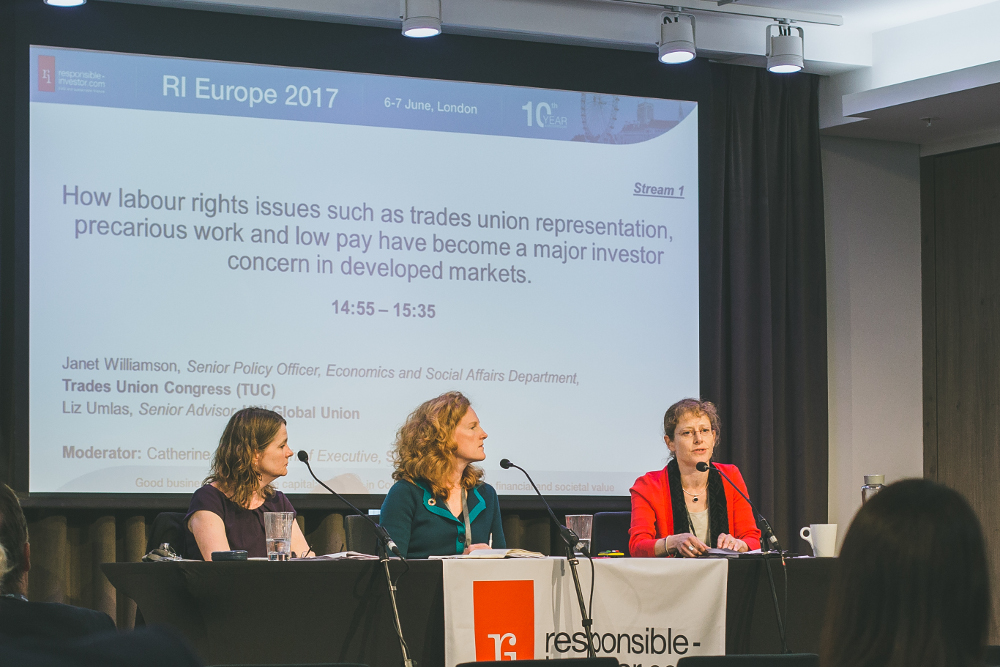
Liz Umlas, Senior Advisor, UNI Global Union said while investors and insurance companies had been pulling away from companies with a poor environmental record there wasn’t something similar on labour or human rights issues, with few exceptions: “We find investors seem more receptive on health and safety than organising rights. But if they don’t have those, they don’t have other rights.”
Janet Williamson, Senior Policy Officer, Economics and Social Affairs Department, Trades Union Congress spoke about having little support from fund managers when it filed a shareholder resolution at Sports Direct around its treatment of staff. She contrasted this with the support for the Aiming for A campaign targeting BP and Shell.
She said the new focus for its Trade Union Share Owner (TUSO) group – a coalition of union shareholders engaging on workers rights issues - would be the hotel sector that often had extremely long hours, sometimes not adequately paid.
Human capital as a value driver: Every annual report says people are a company’s most import asset… Why good employment practice, incentives, work conditions and equality is good for business. How does this translate into investment returns?
Guy Janssens, Head of Sustainable and Responsible Investments at BNP Paribas Fortis, described gender equality as a source of alpha: “Adding more women to the board has a positive impact on the company,” he said. He added that more nationalities had a positive impact on innovation and that overall human capital has a positive impact on performance.
Mainstreaming impact: Can impact investing be done in listed securities, and what are the investment parameters?
Sophie Robe, Founder & Chief Executive Officer, Phenix Capital said impact investment was ‘intention, materiality and measurability’ but she said there were issues in finding fund managers “being able to report what is really important.”
Aubre Clemens, Vice President, J.P. Morgan Private Bank said measurement was still nascent and until a standardised approach developed, the Sustainable Development Goals would help as a framework. Robe described investment parameters for impact investment as choosing a company where products and services contribute to a better world. “This is intentionality,” she said. “Pepsi has a good ESG score but it wouldn’t make it into an impact portfolio.”
Measuring impact: What kinds of metrics and tools can be used for measurement and reporting of impact across different asset classes: equities, bonds (green/social) and infrastructure? Is this accessible to different types of investors?
Daniel Ingram, Vice President, Responsible Investment Research & Consulting, Wilshire Associates said better reporting on the economic value that businesses create was of interest. He also said he was interested in the idea of ‘net impact’, citing an impact report from WHEB Asset Management that maps the positive and negative impacts of holdings in its sustainability fund.
Emma Doner, Project Manager, Innovation Department, Vigeo Eiris said a lot of work was focused on the Sustainable Development Goals (SDGs) “a language spoken by all stakeholders”. She said impact metrics were taking the SDGs as a base.
Ingram and Doner both said carbon reporting was the star of impact measurement, and more needed to be done on other environmental issues, and the social side. Doner said: “It’s important to keep talking about the social side. It has a lot of room to grow.”
Socialising impact: Looking at the impact benefit for an entire portfolio for better returns and social value
Sarah Forster, Chief Executive Officer, The Good Economy described how it was creating a new social ratings of listed UK companies on how they contribute to SDG 8: decent work and economic growth. The rating, focused on the FTSE, will look at a range of metrics, including company job growth, median earnings and inclusivity in terms of opportunities for young people. It highlights how online retailers tend to hollow out jobs in the places of most need because of automation, but this isn’t the case for traditional companies like GlaxoSmithKline. “All business creates jobs,” she said. “Where and who benefit matters.”
Big Data Processing: How can financial data science be used for sustainable investment returns? Developing client driven investment strategies between asset owners, asset managers and academia.
Andreas Hoepner, Associate Professor of Finance, ICMA Centre, Henley Business School said using data to understand an ESG KPI could create an alpha opportunity. He called data the “new oil”, and a self-generating and renewable resource that was only going to get bigger. But to use it effectively, investors had to find signals in the noise through good extraction of data and formatting.
ESG and financial reporting and measurement by asset owners and asset managers
Mandy Kirby, Director of Reporting, Assessment and Accountability, PRI said that at the end of its last reporting period, in March 2017, it had 1,200 investors reporting to us: “All of them will have their transparency reports available on our website.”
Anne-Catherine Husson Traore, Caisse des Dépôts, Chief Executive Officer, Novethic said the French parliament’s 2015 introduction of Article 173 of the law on Energy Transition and Green Growth was “something very new”. She added: “Asset owners now have a role in pushing companies and asset managers.”
She said new French President Macron, before being elected, worked with the French SIF and said he wanted a push of the French “know-how on responsible investment.”
Ingrid Holmes, Director, E3G said mainstreaming ESG into the financial system necessitated governments to step in and standardize information “because it minimizes time and wasted efforts. This is not about interference in the market but actually about making markets more efficient.” She said the Taskforce on Climate-Related Financial Disclosures (TCFD) would develop into a “licence to operate” for the capital markets.
Fixed income: corporates and the value of sustainability research/allocations - green and sustainable bonds
BNP Paribas Asset Management plans to launch a dedicated green bond fund in September. The fund will focus on hard currency labelled notes, although there is potential for further funds to be launched to invest in local currency transactions, according to Felipe Gordillo, a senior SRI/ESG analyst.
What will the work of the Financial Stability Board’s Taskforce on Climate related Financial Disclosure (TCFD) mean for data and information transparency?
The initial recommendations of the Taskforce on Climate-related Finance Disclosure are expected to be launched at an event in London on June 28th, ahead of a formal presentation to the G20 at its summit in July. Mark Lewis, a member of the taskforce and Head of European Utilities Equity Research at Barclays, said: “When we met in October, before the US presidential elections… there was a high degree of confidence that we would get a formal endorsement from the G20… obviously, we’ve already seen President Trump at one international conference [the recent G7 meeting], and based on our experience of that, whether he will be willing to endorse formally the findings of this report is, at the very least, open to question”. All G20 countries must support a statement before it can be endorsed by the body, and this seems unlikely based on Trump’s recent withdrawal from the Paris Accord. “But the important thing is that this will be presented at the Financial Stability Board, and I hope other governments will look at it seriously and think about bringing it into their legislation.”
Corporate spotlight: Total
Vincent Dufief, Investor Relations Manager, Total, said: “Today we are still an oil and gas company. Our revenue, our cash, is generated by oil and gas, but we are transitioning towards a low carbon business.” But, he said, Total has to manage “two different paces” one for ESG investors, who are more long-term driven; and another one for the so-called mainstream investors, who are more short-term. Dufief said Total had avoided shareholder resolutions on climate change risks, unlike its competitors, because of its forward-looking action.
Valerie Quiniou, Vice President, Climate, Total, said Total takes into account the fact that there is a carbon budget that the world shouldn't exceed. That means, of all existing and known reserves, Total will focus on the most competitive ones, i.e. cost-effective ones. She called it “climate and economics working together”.
Total is in favour of, and advocates for, carbon pricing: “It might seem bizarre an oil and gas company asking for carbon pricing but, together with a few oil and gas companies we have done this for more than three years now”.
She said Total produces and publishes a shadow carbon price “for both, assessing the robustness of our existing portfolio but also for selecting new investments”.
Corporate spotlight: BT’s purposeful business approach to value creation
Joanna Gluzman-Laukhanen, Director of Analyst Relations, Market Intelligence & SRI engagement at BT complained that “the investment community is not going with us. I have not seen much change.” Questionnaires and assessments were “all the same” – that’s to say they were more of a compliance issue. “I don't see value creation.” The PRI, she said, had an opportunity in terms of value creation, though nobody, from her point of view, was looking at the long-term. She posed a stark question to the session: “What’s your purpose?”
I think ‘ESG’ needs to move away from a box ticking exercise towards ‘purposeful value’
“All that the PRI is doing is creating guidelines. I see no value creation. I see a lot of box ticking”
Corporate spotlight: AB-Inbev
Ezgi Barcenas, Sustainability Global Director at AB-Inbev, said the global brewer was potentially looking at integrated reporting “further down the line”. The firm is partnering with water.org, the organisation co-founded by film star Matt Damon, to provide access to water to 3.5m people by 2020. Asked about the company issuing a green bond, Barcenas said the team had looked at potentially issuing such a bond to “plant seeds in the company” although she did highlight an “administrative burden” and the fact that Repsol’s green bond had met with some controversy.
The company has set a target of 100% renewable energy by 2025 and invested in energy storage firm SAFT. It also has environmental targets that are tied to renumeration.
Emerging markets: As the global middle class grows, will it work, live and travel more sustainably, or will it be forced to?
Ritu Kumar, Director of Environmental and Social Responsibility, CDC, said emerging markets represent an opportunity to integrate ESG performance into the investment strategy: “As a responsible investor you really have the chance to influence, shape and improve standards” due to “weak or no legislation, or legislation that is not properly enforced. We find that companies we invest in, or the fund managers we support, have become open to the idea, especially when you are able to demonstrate that there is a financial value to it. And these guys are savvy, they know their business and how it works in those markets.”
Egon Vavrek, Head of EMEA Equities, APG Asset Management highlighted the pioneering and leading role of stock exchanges in emerging markets, particularly the South African one after they introduced Integrated Reporting as a listing requirement. “There are encouraging signs from South African and Brazil's stock exchanges as drivers for company disclosure.”
How do issues around environmental, social and governance affect the sustainability of sovereign debt and how can investors examine the associated risks?
James Lockhart-Smith, Head of Financial Sector Risk and Verisk Maplecroft, said exclusion of sovereign bonds on ESG grounds was “an option but a fig leaf” and that the state of research on ESG and sovereign bonds was much less developed than in equities. But he was clear that ESG and political risks were closely correlated - citing the example of Brazil’s Petrobras corruption scandal – though he said they are often poorly ‘priced in’.
Graham Stock, Emerging Markets Senior Sovereign Strategist at BlueBay Asset Management, discussed a recent seven-year issue by the Maldives that he said had various E, S and G “red flags”. His firm did not participate in the offering, he said in response to a question from the floor. He noted how engagement with sovereigns on ESG issues is difficult, especially in an environment where terms like “hunger bonds” were being bandied about in reference to Venezuela. But excluding a particular country is difficult, he said, observing: “what are the criteria for doing that?”
Exclusions: What have been the major trends in corporate exclusions to date, and based on what evidence?
Hilde Jervan, Chief Advisor at the Council On Ethics for the Norwegian Government Pension Fund Global, said of the asset owners’ engagement work with garment manufacturers: “The jury’s still out, we don't know where this is heading. The challenge is to make the changes last.”
Real assets, reputation and biodiversity
Mark Mansley Chief Investment Officer, Environment Agency Pension Fund said investors needed a “deeper understanding” of agriculture investments, in terms of due diligence: “There’s a lot that can go wrong.” Mansley also added that: “Biodiversity is one of the great unanswered challenges of the RI world.”
Mark Gough, Executive Director, Natural Capital Coalition, warned of being too process oriented, pointing out that in some cases, certification can sometimes limit innovation.
Barriers to effective stewardship for asset owners: the journey of the Red Line Voting Campaign
Janice Turner, Member, Department for Work and Pensions Trustees Panel and Co-Chair, Association of Member Nominated Trustees (AMNT) said its Annual Member survey showed that 59% of scheme boards disclosed on ESG, but that 38% had no explicit ESG policy and did not know how their share votes were carried out: “Therefore many Trusts are “not meeting the expectations of regulators”.
Turner said there was a lack of advice on ESG issues despite top-level awareness in the consultant industry.
Peter Sparkes, Trustee, Thomas Cook Pension Scheme and Committee Member, AMNT said that bolstered by regulatory changes with regards to ESG “Trustees should up the ante” and use the RFP process to select consultants with ESG sensitivity.
Turner added: “I’ve been surprised since we launched the Red Lines about the reticence of some fund managers who pension funds pay to act as their ‘agents’: it’s quite incredible.”

